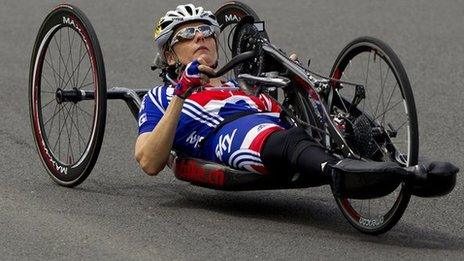Rio Paralympics 2016: When 'The Superhumans' came to London
- Published
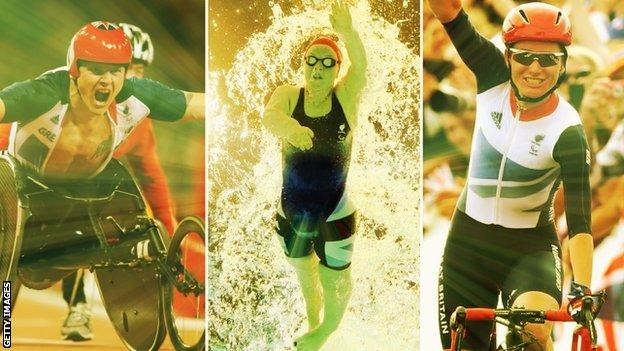
(from left to right) David Weir, Ellie Simmonds and Dame Sarah Storey were the leading figures for ParalympicsGB
"Look up, stretch your wings and fly..."
From the theatrical opening ceremony to the packed arenas to the feats on the sporting stage, the London Paralympics offered and delivered a new perspective on disability sport.
With the start of the Rio Games on Thursday, we look back at an event that altered the perception of the Paralympics being an 'Olympics afterthought'.
The right buzz leads to record sales
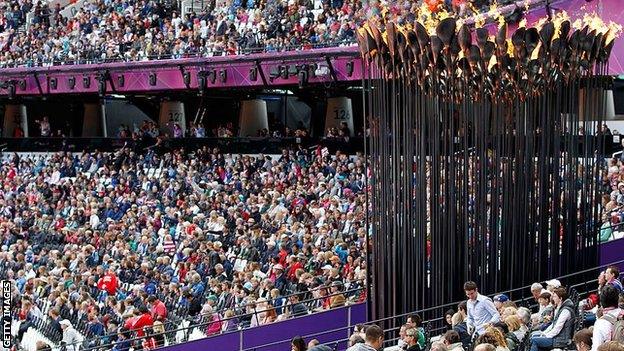
More than 2.7 million tickets were sold for the London Paralympics, beating Beijing 2008 by almost a million
In a piece for Inside the Games,, external British Paralympic Association chief executive Tim Hollingsworth wrote: "The power of the Paralympic Games lies not in the gathering together of more than 4,000 disabled people, it lies in those people being elite athletes taking part in thrilling sport."
From the outset, the organising committee wanted the London Paralympics to be a sporting event which would elicit reactions of wonderment rather than sympathy and where the focus was on the sporting battles.
That vision was aided, in no small part, by the promotional strategy and key to that was the new domestic television broadcaster of the Games - Channel 4.
At 21:00 BST on Tuesday, 17 July 2012, a 90-second advert called 'Meet The Superhumans' was televised simultaneously across 78 channels. It was the network's most ambitious and biggest marketing campaign.
It featured British Paralympians displaying their abilities to the memorable hook of Public Enemy's Harder Than You Think. It was innovative and impactful.
That complemented what was already an attractive sell. The chance to visit the impressive Olympic Park was a lure and many also wanted to sample something similar to the good vibes of the Olympic Games.
With a year to go an impressive 1.2 million tickets had been sold in the first rounds of sales and by the end of the Games that had increased to 2.76 million - beating Beijing's sales total by almost a million.
So did the sport deliver?
Incredible feats wow public
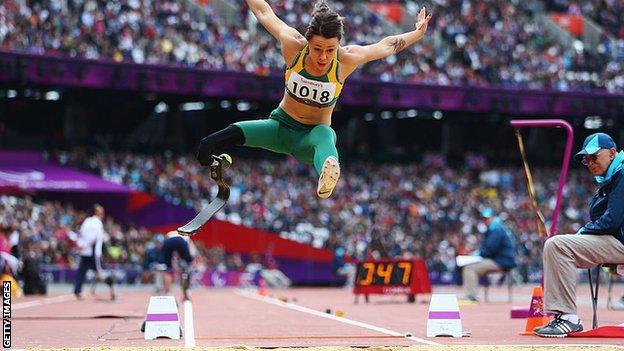
Kelly Cartwright produced a world record in her women's long jump final
For many of those watching either at the venues or from home, the Paralympics was their first experience of high-class disability sport.
They saw athletes with missing limbs bound over the high jump bar - like Fiji's F42 gold medallist Iliesa Delana - and leap large distances in the long jump, as when Australian Kelly Cartwright set a new world record of 4.38m.
In the pool, China's Tao Zheng, who lost both of his arms as a result of an electric shock, used the power in his legs to win the men's S6 100m backstroke.
There was visually impaired football, sitting volleyball and wheelchair rugby - and all took place in packed arenas around London.
Weir and Storey lead GB medal blitz
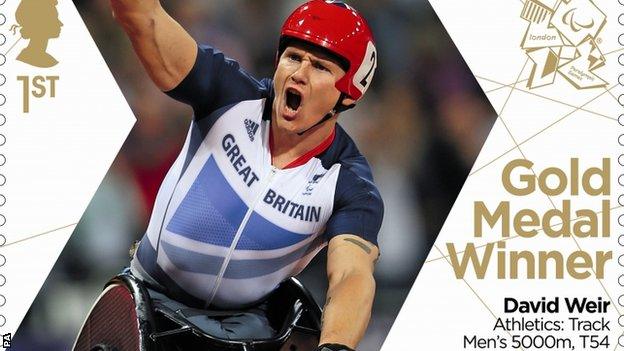
The Royal Mail produced a Gold Medal stamp to celebrate David Weir's victory in the men's T54 5,000m final
The stage and the crowds were impressive, so now it was up to Great Britain to live up to expectations as hosts.
ParalympicsGB won 102 medals at Beijing 2008 and a target of 103 was set for London, which they surpassed with ease, finishing the Games with 120.
The team also produced their own version of 'Super Saturday' - 'Thriller Thursday' - as David Weir, Jonnie Peacock and Hannah Cockcroft in the athletics, swimmer Josef Craig, sailor Helena Lucas and cyclist Sarah Storey all won gold on a memorable day eight of the Games.
Wheelchair racer Weir, who earned the moniker "the Weirwolf", won three golds in the Olympic Stadium before mustering enough energy to win the marathon, and Storey, who was later made a Dame, won four cycling titles.
But it was Great Britain's Paralympics poster-girl, Ellie Simmonds, who once again stole the affections of the watching public by winning two more golds in the pool to increase her Paralympics medal haul to four at the ripe old age of 17.
Pistorius and the blade controversy
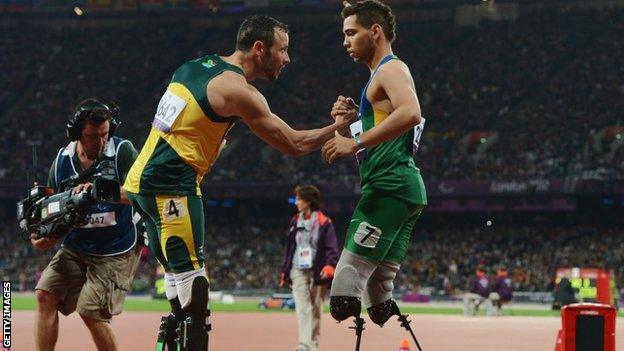
It was relatively cordial between Oscar Pistorius (left) and Alan Oliveira straight after the race
While Simmonds was Great Britain's figurehead, global superstar Oscar Pistorius was the face of the Paralympics. The sprinter, who won gold at the 2004 and 2008 Games, had recently become the first male Paralympian to compete in an Olympic track event, having taken part in the 400m a few weeks earlier.
Given his stature, the pressure was now on him to add more Paralympic titles in London. His target was four golds, and he was a strong favourite in both the T44 200m and 400m. However, his campaign got off to both a losing and controversial start.
Pistorius was beaten by Alan Oliveira in the T44 200m final, having been run down by the Brazilian in the last 20 metres.
The South African claimed afterwards that Oliveira's blades were too long, stating it was "absolutely ridiculous" he was closed down in those last few metres. The Brazilian's blades had been cleared for competition.
That outburst came a year after Pistorius walked out of a BBC radio interview in protest at a question asked.
Pistorius, now 29, will not be competing in Rio because he is serving a six-year jail sentence for murder.
'A different attitude'
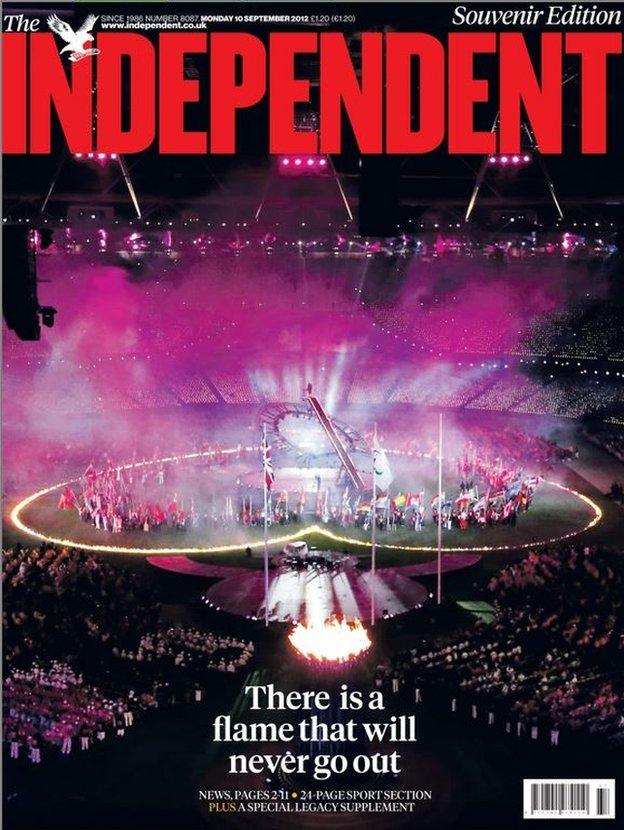
The Independent's front page on 10 September led with the Paralympics closing ceremony
The greatest Paralympic Games ever? Probably.
That was the view not only of International Paralympic Committee chief Sir Philip Craven, but many others who witnessed huge crowds and coverage like never before.
Channel 4 devoted much of its airtime for two weeks to the Games, with audience figures of 6.3 million watching Peacock's 100m battle with Pistorius and 5.5 million tuning into to see Weir's 800m victory.
Did it change people's perceptions of those with disabilities?
The results of an online Ipsos Mori poll, external showed that 81% of British adults said the Paralympics had a positive impact on the way disabled people were viewed by the public. However, a year later a poll by disability charity Scope, external said 81% of disabled people had not noticed attitudes towards them improving since London 2012.
Baroness Grey-Thompson, an 11-time Paralympic gold medallist, said the London 2012 games did change views, but added it had not been reflected in the wider community.
Rio has been unconvincing so far in its efforts to build on the achievements of the London Paralympics, with financial problems a blight on the build-up.
In a piece for the Daily Telegraph,, external Baroness Grey-Thompson said: "Four years ago London was completely overhauled for the Paralympics, with every Olympic logo, every poster changed or altered in time for the second instalment.
"Our sport had been made a priority, as much as the Olympians had weeks beforehand. Sadly, in Rio that feat will not be repeated."
The Rio Paralympics has big boots to fill.
- Published6 September 2016
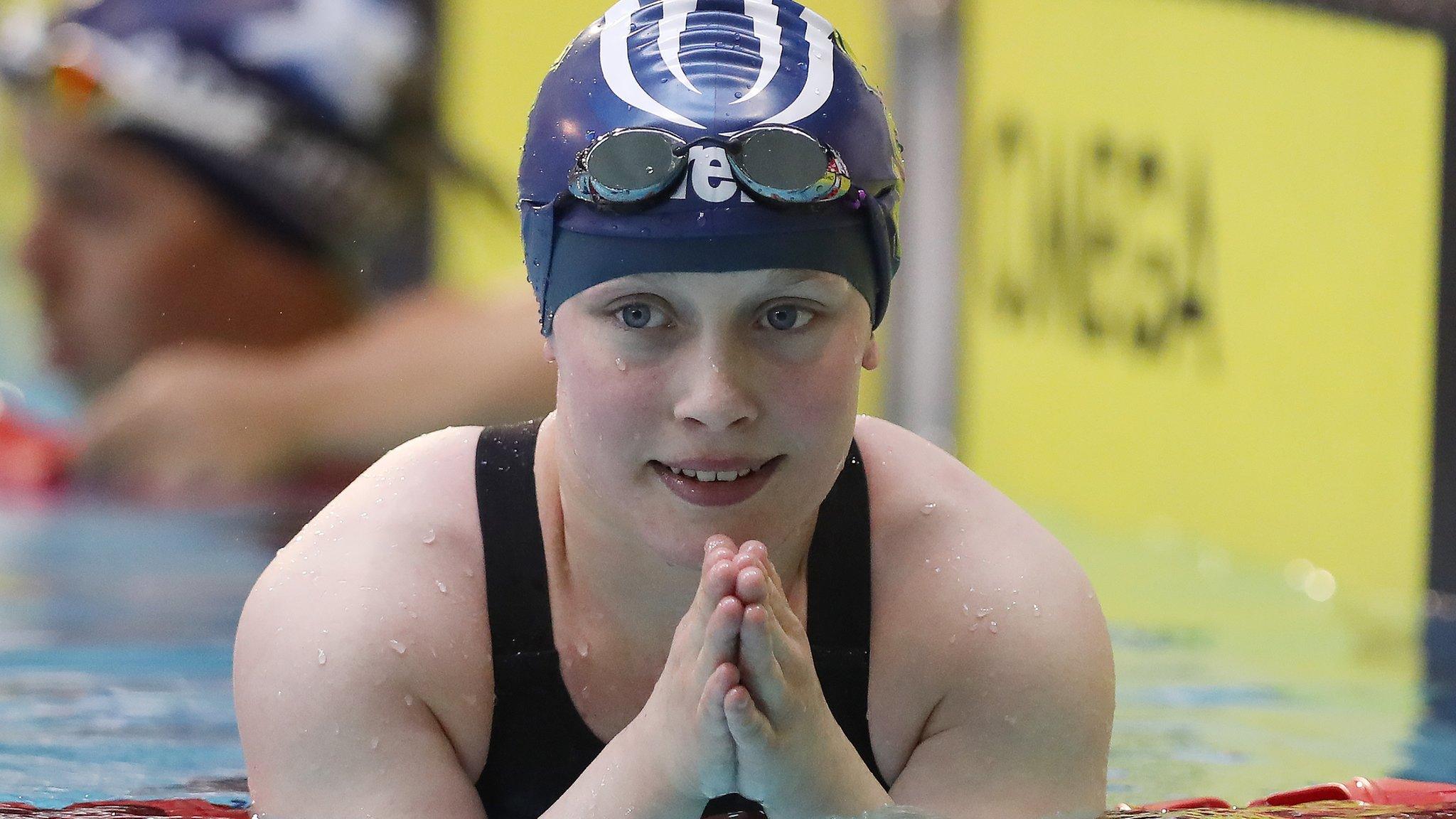
- Published18 September 2016
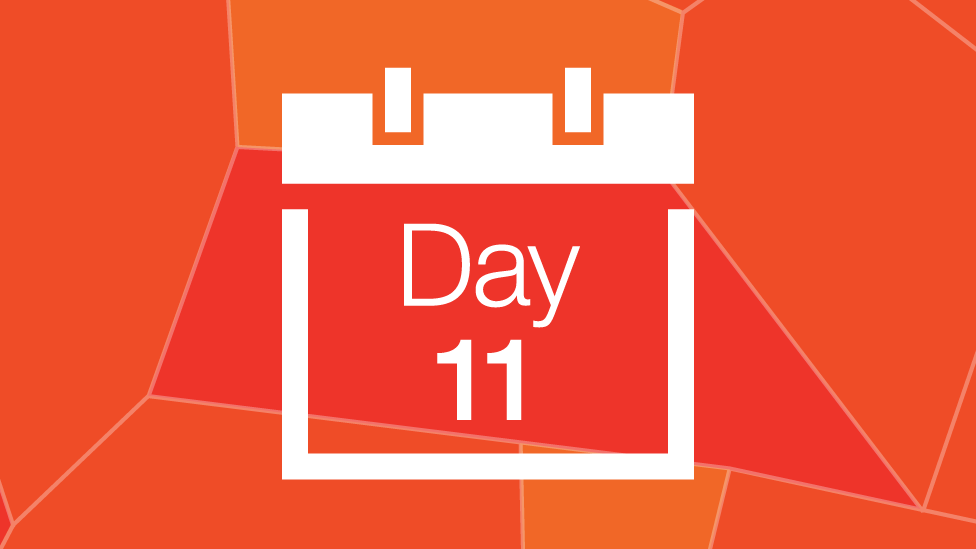
- Published29 August 2016
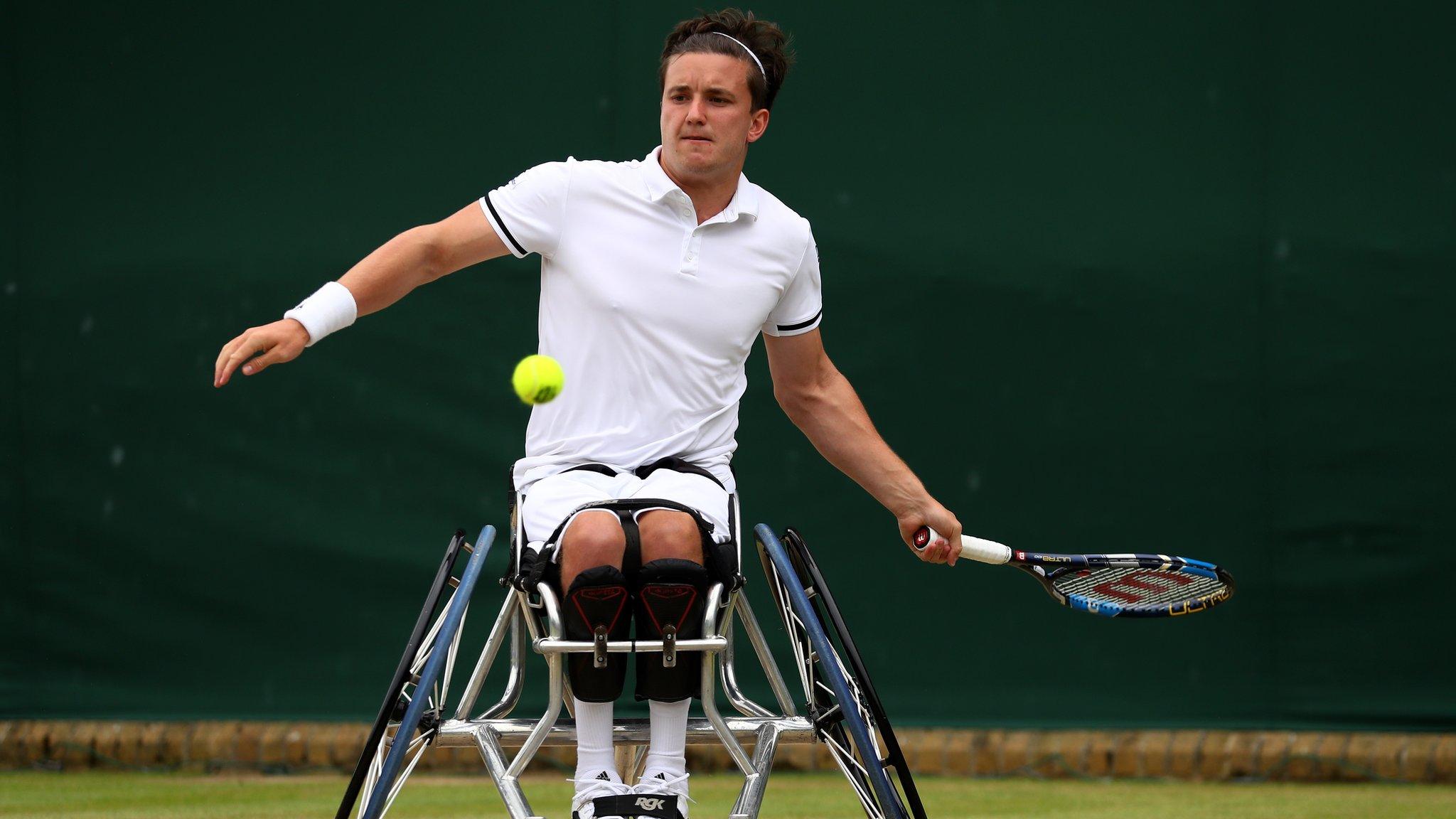
- Published23 August 2016
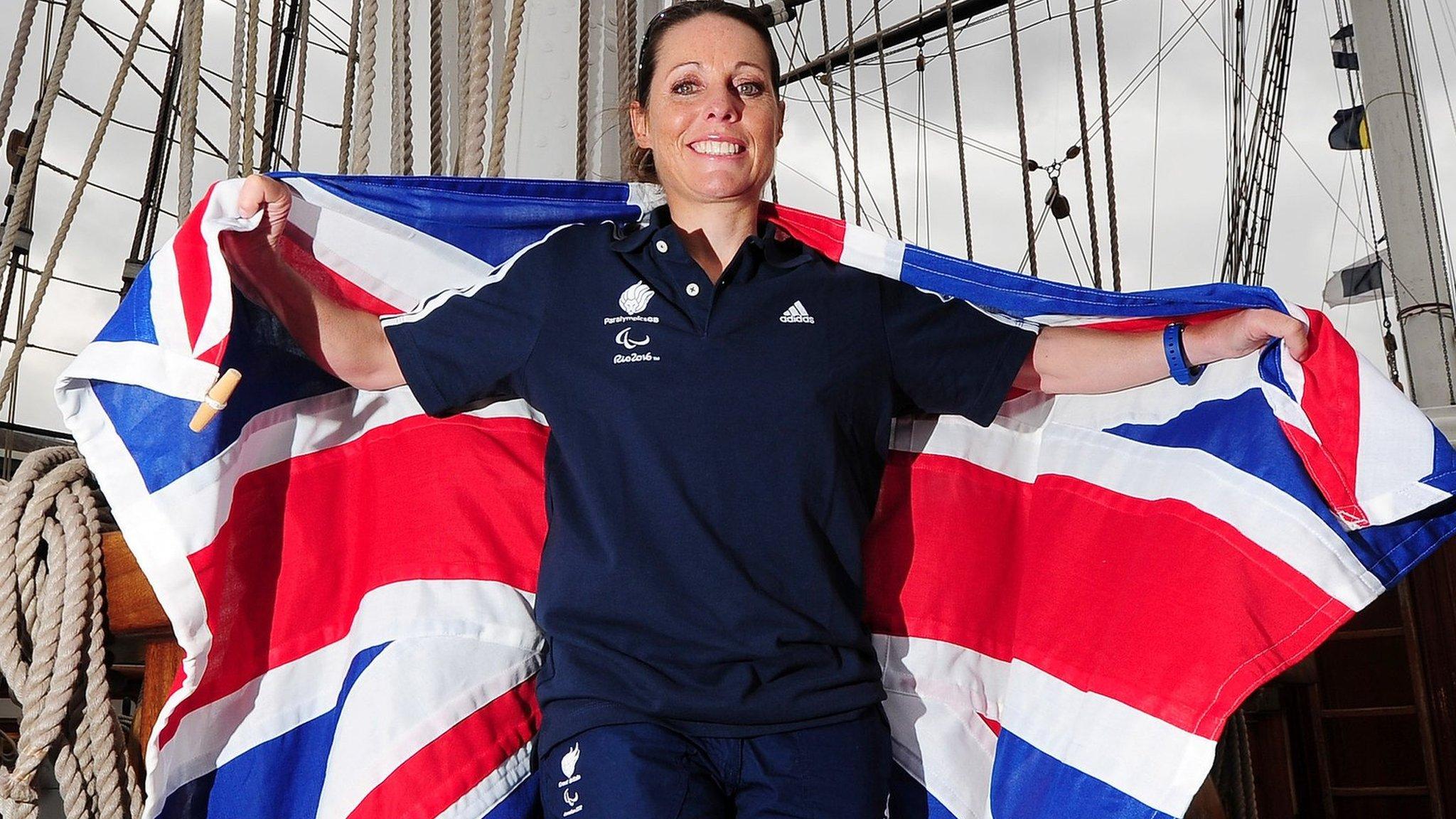
- Published5 September 2016
